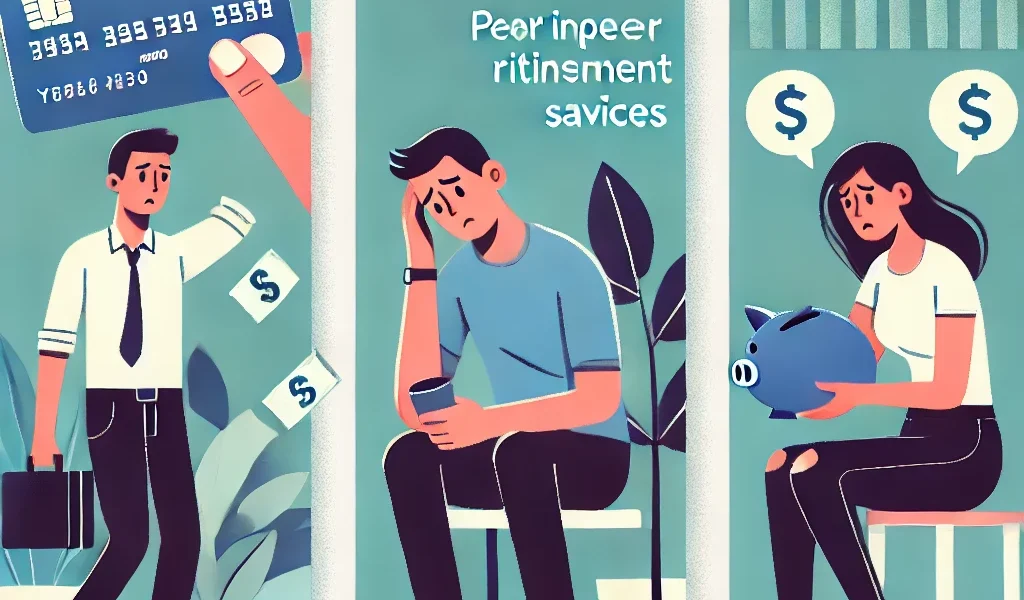Managing money wisely at every stage of life is crucial for long-term financial success. However, many people make financial mistakes that can lead to debt, stress, and missed opportunities. By understanding and avoiding these common pitfalls, you can build wealth and achieve financial freedom.
In this guide, we’ll break down the most common financial mistakes people make in their 20s, 30s, and 40s—and how to avoid them.
Financial Mistakes to Avoid in Your 20s
Your 20s are a time of self-discovery, career-building, and newfound financial independence. However, they are also a critical period for setting a strong financial foundation.
1. Not Creating a Budget
Without a budget, it’s easy to overspend and lose track of your finances. Many young adults rely on credit cards or live paycheck to paycheck, which can lead to financial instability.
How to Avoid:
- Track your income and expenses using apps like Mint or YNAB.
- Follow the 50/30/20 rule: 50% for needs, 30% for wants, and 20% for savings and debt repayment.
2. Accumulating Credit Card Debt
Credit cards offer convenience but can also lead to high-interest debt if not used responsibly. Many people in their 20s overspend and struggle to pay off their balances.
How to Avoid:
- Pay off your balance in full each month.
- Use credit responsibly and avoid impulse purchases.
- Opt for a secured credit card if you’re building credit.
3. Not Saving for Emergencies
An emergency fund is essential for unexpected expenses like medical bills, car repairs, or job loss. Many young adults neglect this, making them financially vulnerable.
How to Avoid:
- Save at least 3-6 months’ worth of living expenses.
- Automate savings with a dedicated high-yield savings account.
4. Ignoring Retirement Savings
Many people think retirement is too far away to start saving. However, the earlier you start, the more you benefit from compound interest.
How to Avoid:
- Contribute to a 401(k) or IRA as soon as possible.
- Take advantage of employer matching contributions.
5. Overspending on Lifestyle Upgrades
Many young adults spend beyond their means, upgrading their cars, gadgets, or renting luxury apartments they can’t afford.
How to Avoid:
- Live within your means and avoid lifestyle inflation.
- Differentiate between wants and needs.
Financial Mistakes to Avoid in Your 30s
Your 30s bring new responsibilities—marriage, homeownership, children, and career advancements. However, financial missteps during this decade can significantly impact long-term wealth.
1. Not Having a Clear Financial Plan
Many people in their 30s earn more but don’t have a structured plan for their financial goals.
How to Avoid:
- Set clear short-term and long-term financial goals.
- Meet with a financial advisor if needed.
2. Taking on Too Much Debt
At this stage, you may have student loans, a mortgage, or car payments. High debt levels can lead to financial stress and limit investment opportunities.
How to Avoid:
- Pay off high-interest debt first (credit cards, personal loans).
- Avoid unnecessary loans for luxury purchases.
3. Not Investing Wisely
Many people in their 30s either avoid investing due to fear or invest without proper knowledge, leading to poor decisions.
How to Avoid:
- Diversify investments across stocks, bonds, and real estate.
- Consider low-cost index funds for steady long-term growth.
4. Ignoring Life and Disability Insurance
If you have dependents, not having life or disability insurance can put your family at risk.
How to Avoid:
- Get adequate life and health insurance to protect your family.
- Look into disability insurance in case of job loss due to illness.
5. Not Saving Enough for Retirement
By your 30s, you should be actively contributing to retirement accounts. Failing to save enough can make retirement planning difficult.
How to Avoid:
- Increase 401(k) or IRA contributions annually.
- Aim to save 15-20% of your income for retirement.
Financial Mistakes to Avoid in Your 40s
Your 40s are a critical time to maximize earnings, solidify investments, and prepare for retirement. However, financial missteps at this stage can be costly.
1. Not Catching Up on Retirement Savings
If you haven’t saved enough in your 20s or 30s, your 40s are the time to catch up.
How to Avoid:
- Utilize catch-up contributions for retirement accounts (age 50+).
- Increase savings by maximizing 401(k), IRA, and HSA accounts.
2. Not Having a College Fund for Your Kids
Many parents prioritize their child’s education but forget that they also need to save for their own future.
How to Avoid:
- Open a 529 College Savings Plan or an Education Savings Account (ESA).
- Don’t sacrifice retirement savings for children’s education.
3. Holding Too Much in Cash
Keeping too much money in savings accounts instead of investing can limit your long-term financial growth.
How to Avoid:
- Keep emergency funds in high-yield savings, but invest surplus cash.
- Balance investments across stocks, bonds, and real estate.
4. Ignoring Estate Planning
Many people in their 40s overlook the importance of estate planning, which can create financial difficulties for their family in the future.
How to Avoid:
- Set up a will and trust.
- Designate beneficiaries and assign power of attorney.
5. Not Preparing for Healthcare Costs
As you age, medical expenses increase. Failing to plan for these costs can strain your finances.
How to Avoid:
- Contribute to a Health Savings Account (HSA).
- Research long-term care insurance options.
Conclusion
Every stage of life presents unique financial challenges, but avoiding common mistakes can set you up for long-term success. By budgeting, saving, investing wisely, and planning for the future, you can secure financial stability and build wealth.
No matter your age, it’s never too late to make smarter financial decisions. Start today and take control of your financial future!



